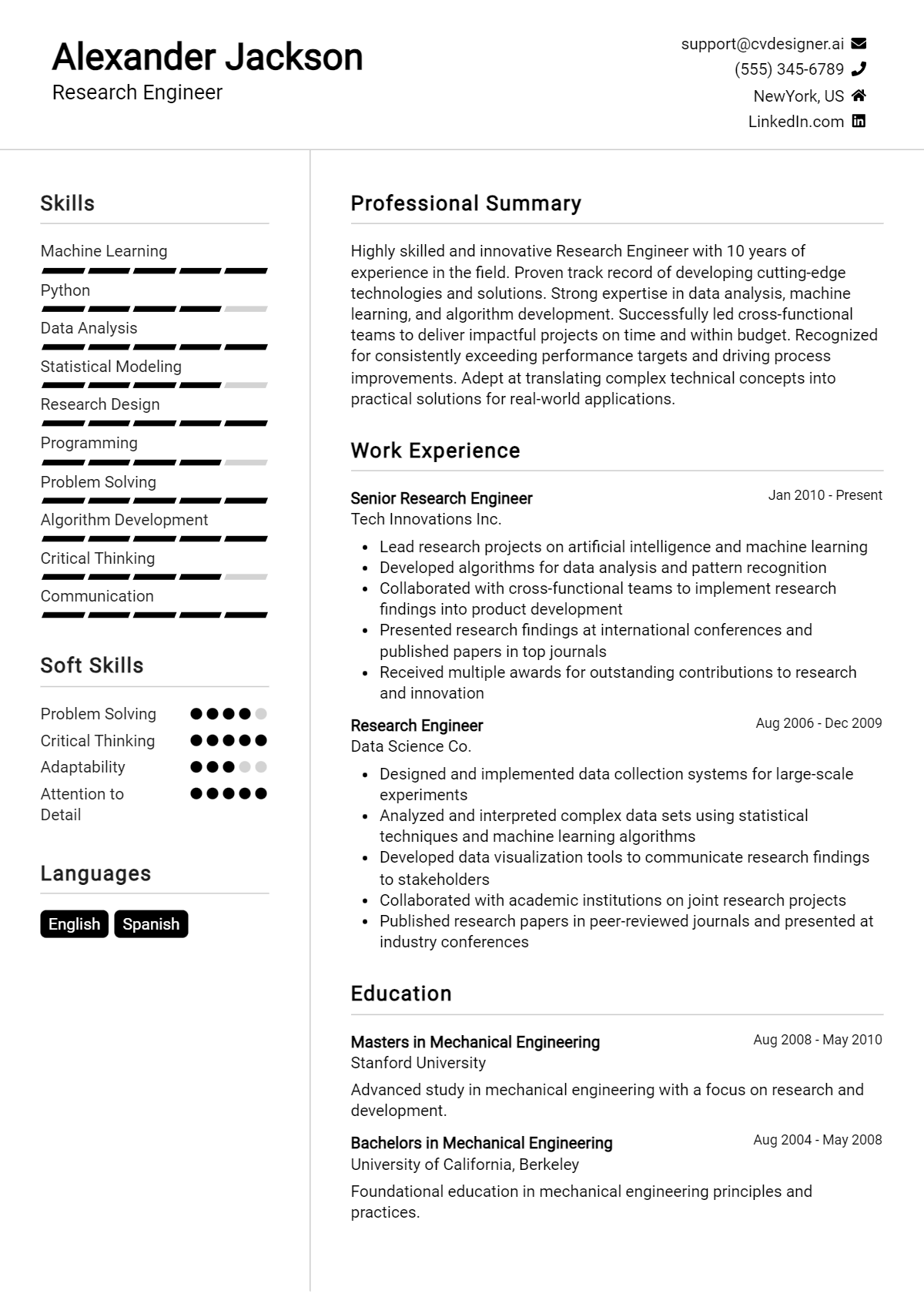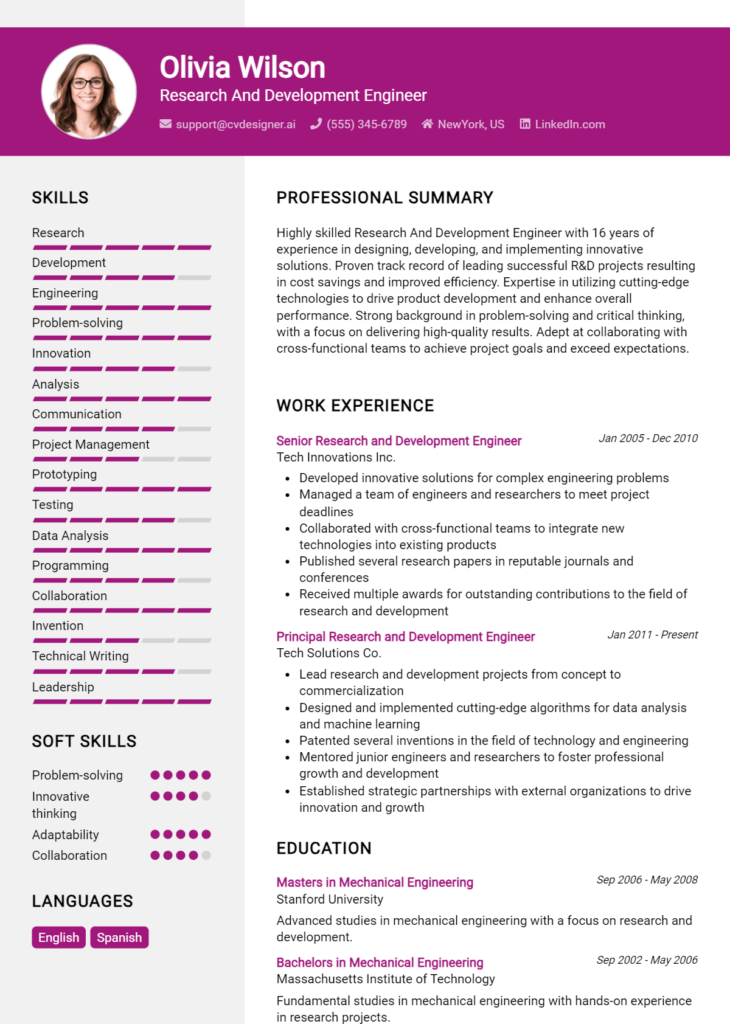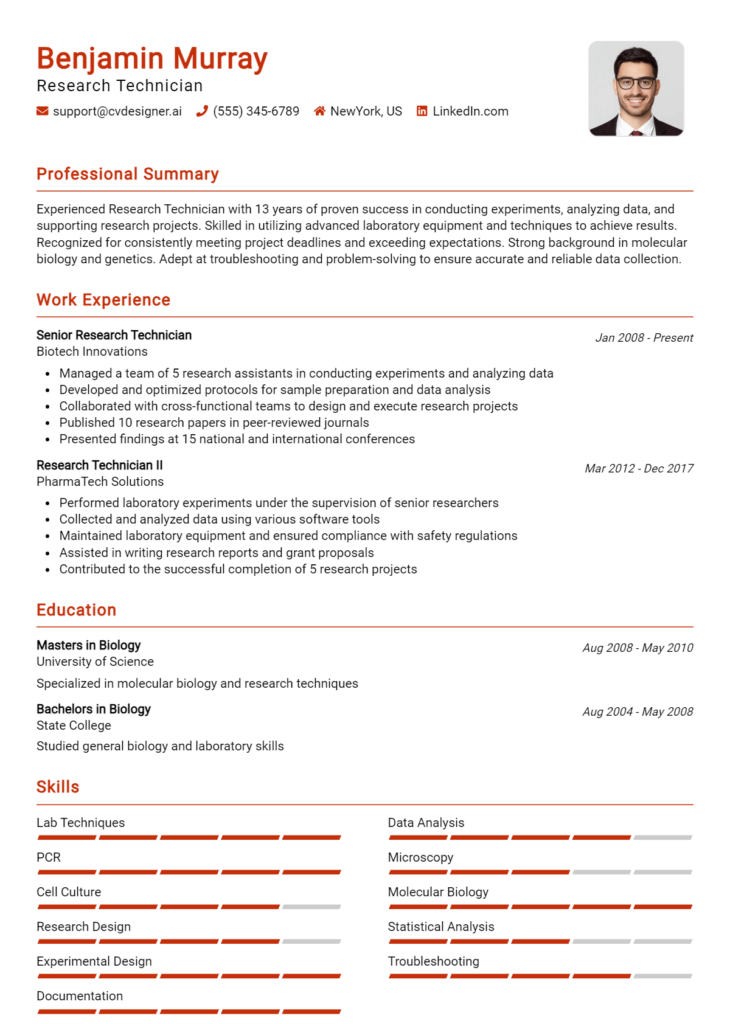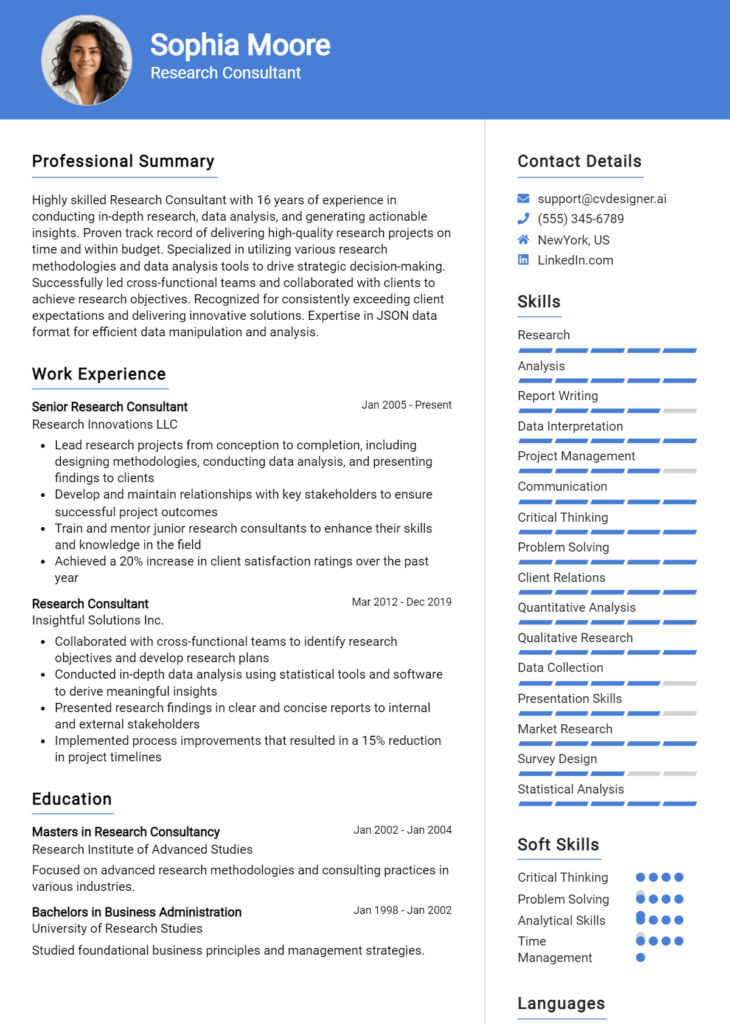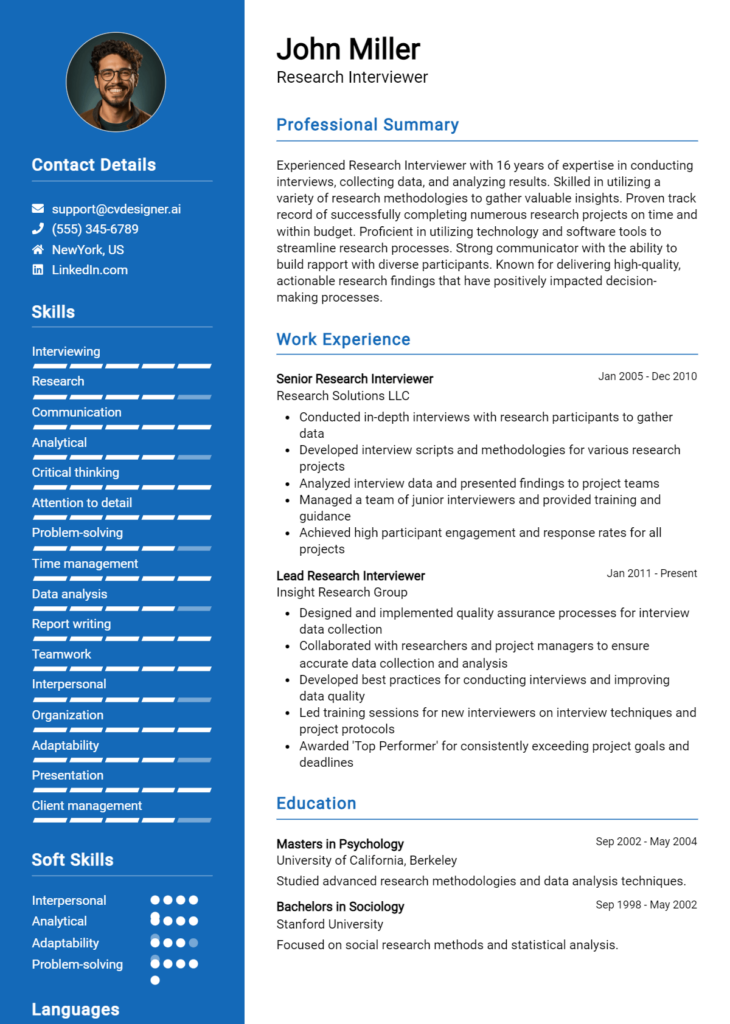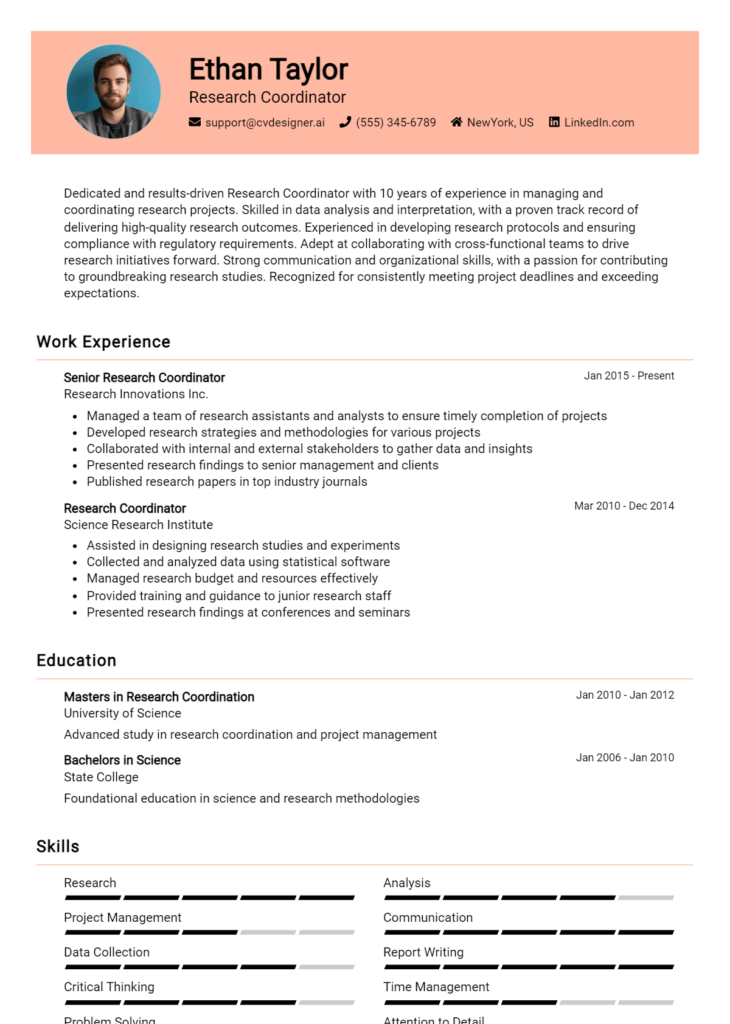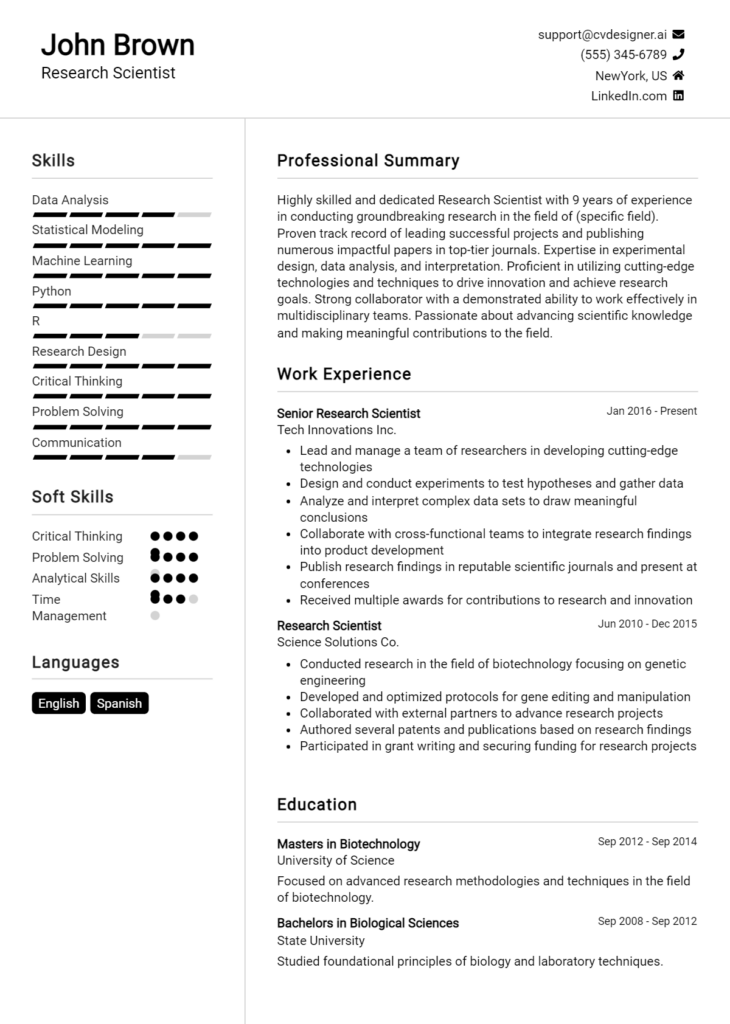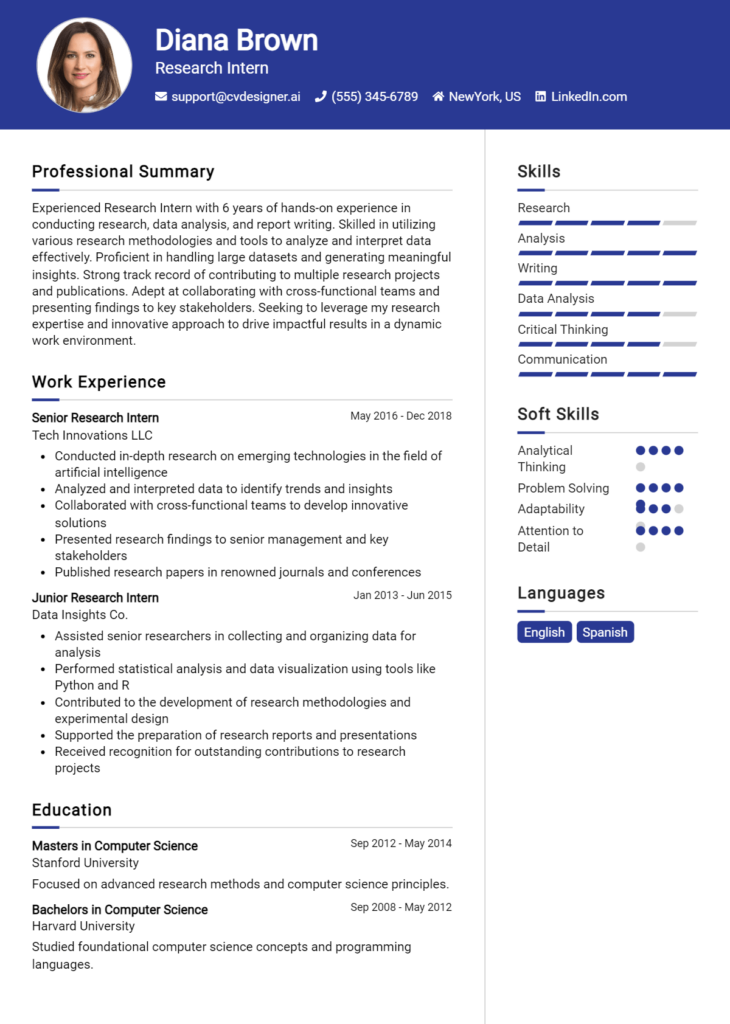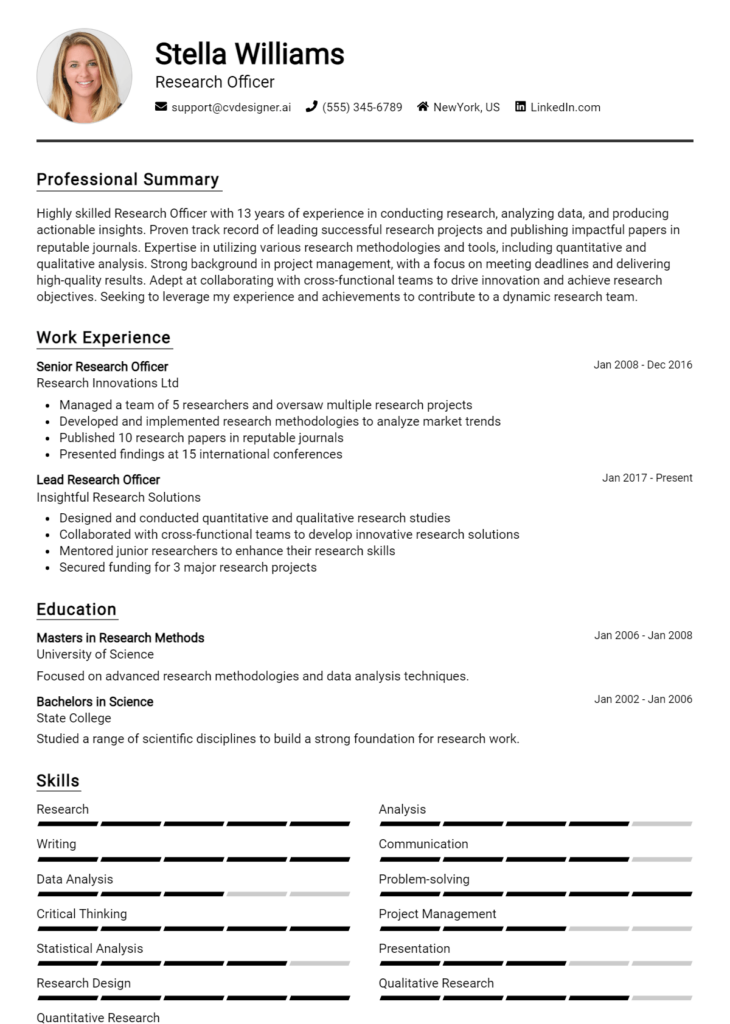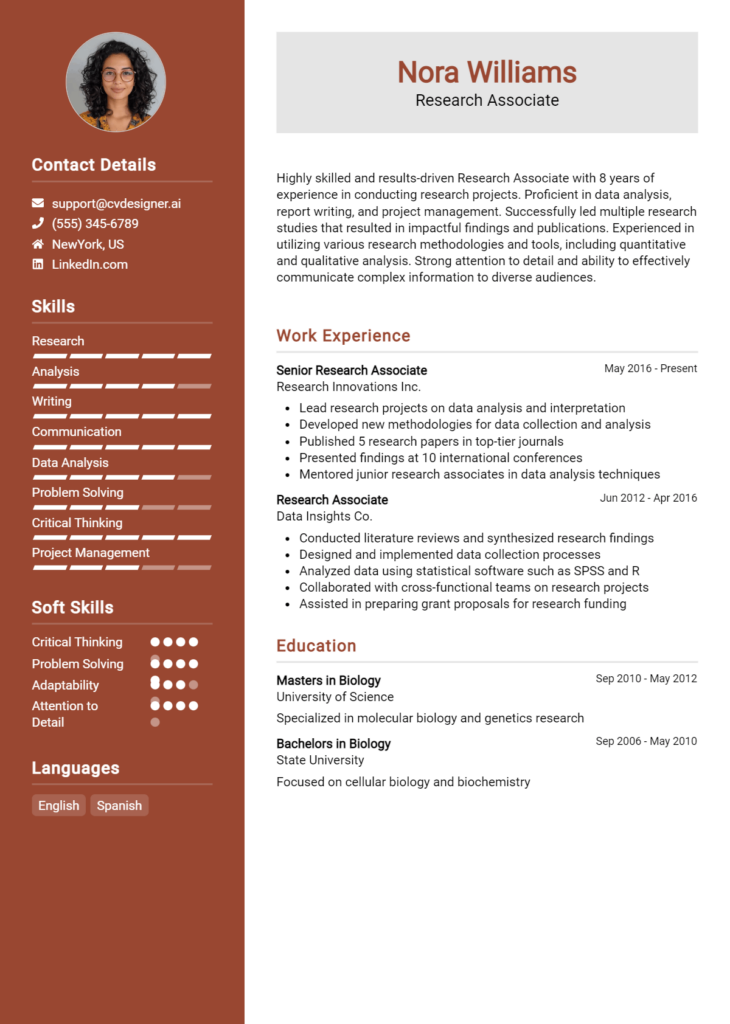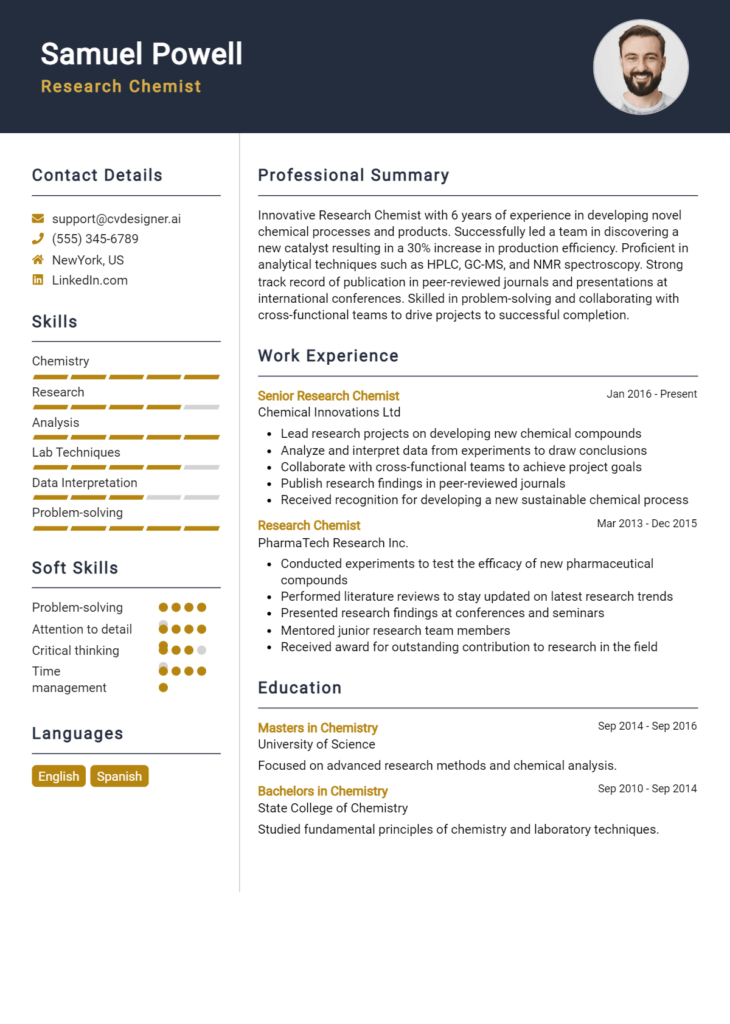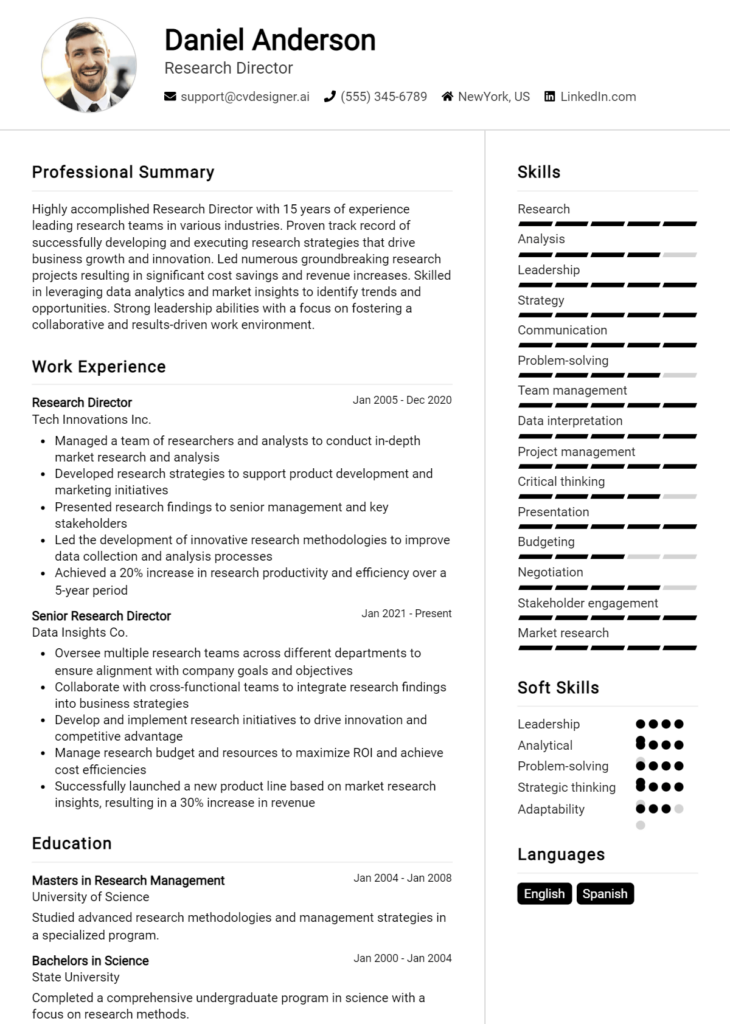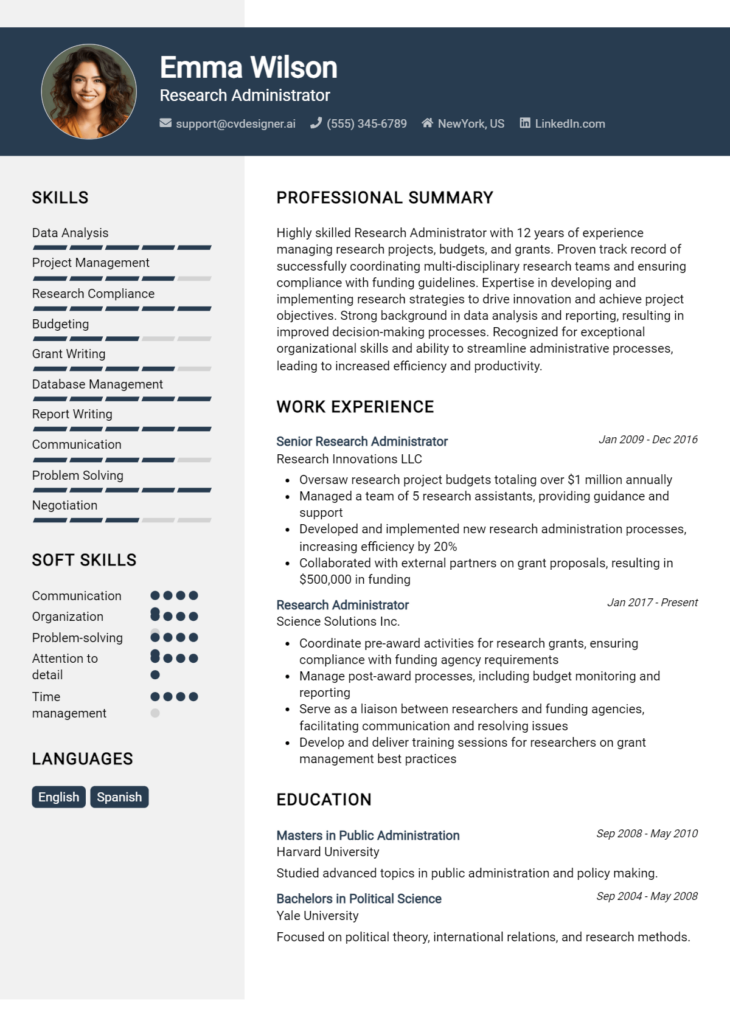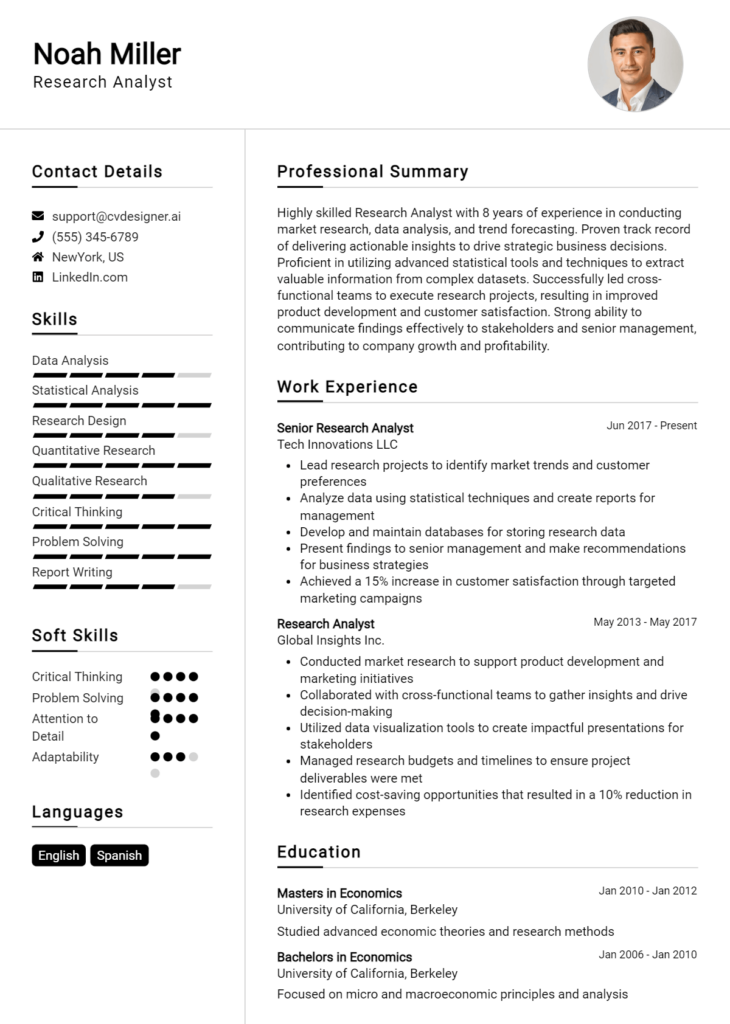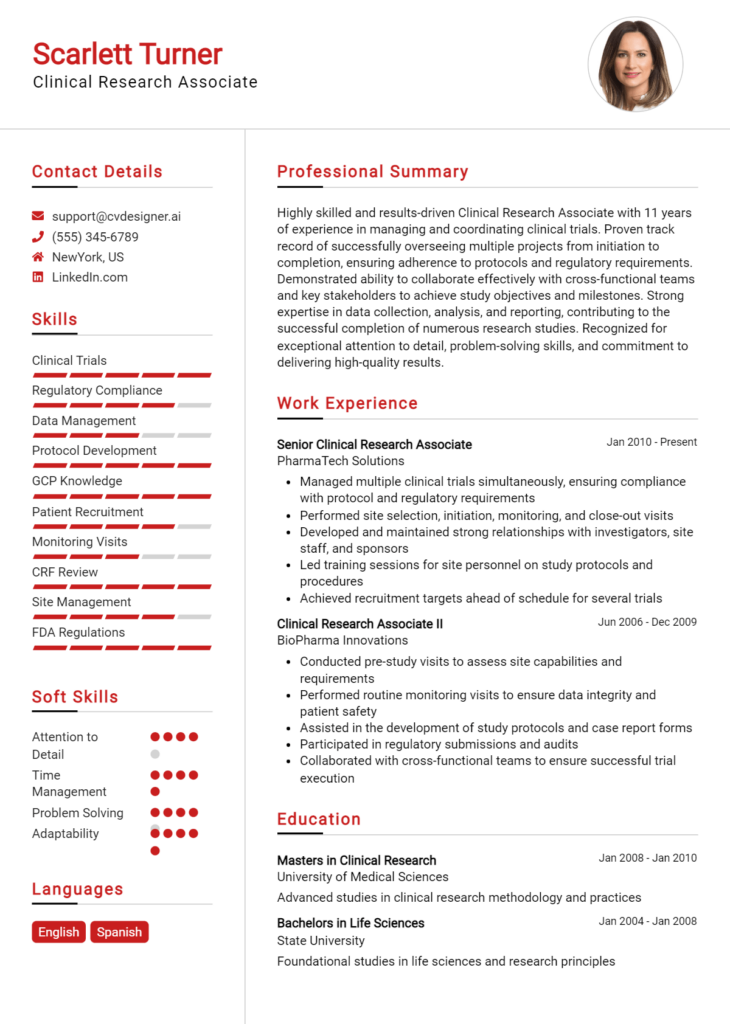Most Popular Research Engineer Resume Examples
Explore additional Research Engineer resume samples and guides and see what works for your level of experience or role.
As a Research Engineer, you play a pivotal role at the intersection of innovation and application, pushing the boundaries of technology to develop solutions that can transform industries. Whether you're exploring new materials, designing algorithms, or conducting experiments, your contributions are essential to advancing knowledge and driving progress. However, to secure the opportunity to showcase your talents, a well-crafted resume is crucial. Your resume not only serves as a reflection of your skills and experiences but also as your first impression to potential employers. A compelling resume can open doors to exciting projects and collaborations, setting the stage for a fulfilling career.
In this comprehensive guide, we will delve into the key components of an effective Research Engineer resume. You'll learn about the core responsibilities and skills that should be highlighted, ensuring you present yourself as a strong candidate. We will discuss the best resume formats to use, helping you organize your information clearly and attractively. Additionally, we will identify common mistakes to avoid, ensuring your resume stands out for the right reasons. With resume examples tailored for all experience levels, you'll find inspiration for crafting your own. Finally, we’ll provide tips on resume writing techniques and how to select the right resume templates to make a lasting impression. Get ready to elevate your job search with a resume that truly reflects your expertise and potential.
Key Responsibilities and Skills for a Research Engineer
As a Research Engineer, you play a pivotal role in advancing technology and innovation through rigorous research and development. Your key responsibilities typically involve:
- Conducting experiments and simulations to test hypotheses and validate concepts.
- Analyzing data and interpreting results to draw meaningful conclusions.
- Collaborating with cross-functional teams to integrate research findings into practical applications.
- Designing and developing prototypes or models to demonstrate new technologies.
- Documenting research processes and findings for publication and presentation.
- Staying updated with industry trends and advancements to inform research direction.
To excel in this role, the following essential skills are required:
- Strong analytical and problem-solving abilities.
- Proficiency in programming languages (e.g., Python, C++, MATLAB).
- Experience with data analysis tools and software (e.g., R, Excel, TensorFlow).
- Knowledge of engineering principles and methodologies.
- Excellent communication skills for presenting complex ideas clearly.
- Ability to work collaboratively in a team-oriented environment.
- Project management skills to oversee research initiatives.
When crafting your resume, it is crucial to highlight these skills effectively in the skills section. Tailoring your responsibilities and skills to align with the specific job description can significantly enhance your application. Consider how these skills not only apply to the Research Engineer role but also how they could strengthen your overall CV. A well-structured CV that showcases your relevant experiences and competencies can set you apart from other candidates and demonstrate your fit for the position.
Best Resume Format and Structure for a Research Engineer
When creating a resume for a Research Engineer position, it’s essential to present your qualifications and experiences in a clear and structured format. Below is a detailed guide on the best resume format and structure to follow, along with tips on what to include in each section.
Contact Information
At the top of your resume, include your contact information. This section should be clear and easy to find. Include the following details:
- Full Name
- Phone Number
- Email Address
- LinkedIn Profile (optional)
- Location (City, State)
Professional Summary
This section should be a brief paragraph that highlights your key qualifications and career goals. Tailor it specifically to the Research Engineer role you are applying for. Focus on:
- Your years of experience in research and engineering.
- Key areas of expertise (e.g., machine learning, materials science).
- Notable achievements or contributions to previous projects.
- Your career objectives and what you hope to bring to the position.
Work Experience
List your work experience in reverse chronological order, starting with your most recent job. For each position, include:
- Job Title
- Company Name, Location
- Dates of Employment (Month/Year)
- Bullet points outlining your responsibilities and achievements. Be sure to:
- Use action verbs to start each bullet (e.g., "Developed," "Conducted," "Analyzed").
- Quantify your achievements where possible (e.g., "Increased efficiency by 20%").
- Focus on relevant experiences that align with the responsibilities of a Research Engineer.
Education
This section should include your educational background. List your degrees in reverse chronological order, including:
- Degree (e.g., Master of Science in Mechanical Engineering)
- University Name, Location
- Graduation Date (Month/Year)
- Relevant coursework or projects (if applicable).
Skills
Create a section that highlights your technical and soft skills relevant to the Research Engineer role. This could include:
- Technical skills (e.g., software proficiency, programming languages, laboratory techniques).
- Research skills (e.g., data analysis, experimental design).
- Soft skills (e.g., problem-solving, teamwork, communication).
Certifications
If you have obtained any relevant certifications, list them in this section. Include:
- Certification Name
- Issuing Organization
- Date Obtained
Additional Sections
Depending on your background and the job requirements, you may also want to include additional sections such as:
- Publications: If you have published papers or articles, summarize them here.
- Conferences: List any relevant conferences you've attended or presented at.
- Projects: Highlight any significant projects you’ve worked on, particularly those that showcase your research skills.
Resume Format Tips
- Use a clean, professional layout with consistent formatting (font size, bullet points, headings).
- Choose a format that enhances readability, such as the chronological or combination format, which showcases experience and skills effectively.
- Keep your resume to one or two pages, focusing on the most relevant information.
Complementing Your Cover Letter
Your resume format should complement your cover letter format. Use the same font style, color scheme, and header design to create a cohesive application package. In your cover letter, expand on key points from your resume, providing context and demonstrating your passion for the role. Address specific projects or experiences mentioned in your resume to illustrate your qualifications further.
By following this structured approach, you can create an effective resume that stands out to potential employers in the field of research engineering.
Writing Tips and Best Practices for a Research Engineer Resume
When crafting a resume as a Research Engineer, it's essential to present your skills and accomplishments clearly and professionally. Highlighting your technical expertise and contributions to projects is crucial, as employers seek candidates who can demonstrate tangible results. Make sure to tailor your resume to the specific job description, emphasizing relevant experiences and using a clean, organized layout to enhance readability. Utilizing resume writing tips can further refine your document, ensuring it meets industry standards. Remember that these best practices also apply when drafting a cover letter, as both documents should cohesively convey your qualifications.
- Use strong action verbs such as "developed," "analyzed," and "optimized" to begin bullet points and convey your accomplishments effectively.
- Quantify your achievements wherever possible, such as stating the percentage of efficiency improvement or the number of projects successfully completed.
- Incorporate industry-specific keywords from the job posting to pass through applicant tracking systems and resonate with hiring managers.
- Structure your resume with clear sections, including a concise summary, skills, experience, and education to guide the reader through your qualifications seamlessly.
- Keep your resume to one or two pages, focusing on the most relevant experiences and avoiding unnecessary jargon.
- Customize your resume for each application, reflecting the responsibilities and qualifications outlined in the job description.
- Highlight any interdisciplinary collaboration or leadership roles, as these experiences can set you apart from other candidates in technical fields.
- Proofread your resume multiple times to eliminate any grammatical or typographical errors, ensuring a polished and professional presentation.
Common Mistakes to Avoid in a Research Engineer Resume
Crafting a compelling resume is essential for a Research Engineer, as it serves as your first impression to potential employers. However, many candidates fall into common traps that can undermine their qualifications and experiences. To ensure your resume stands out for the right reasons, it’s crucial to avoid these pitfalls that can detract from your professional image and the value you bring to the table.
- Overloading the resume with excessive information, making it difficult to read.
- Using generic descriptions that fail to highlight specific skills or achievements.
- Failing to tailor the resume to the job description, resulting in a lack of relevance.
- Neglecting to include quantifiable accomplishments, which can illustrate your impact.
- Overusing jargon or technical language that may confuse non-specialist reviewers.
- Inconsistent formatting, which can give an impression of carelessness.
- Omitting important sections such as publications, patents, or relevant projects.
- Not proofreading for spelling and grammatical errors, which can be detrimental to professionalism.
- Listing responsibilities instead of highlighting achievements, missing the opportunity to showcase impact.
- Ignoring the importance of a strong summary or objective statement that succinctly outlines your career goals and strengths.
To further refine your application materials, consider reviewing the common mistakes to avoid in a resume. This resource can help you steer clear of detrimental oversights. Additionally, don’t forget to explore the common cover letter mistakes to ensure your entire application package presents you in the best light possible.
Sample Research Engineer Resumes
As a Research Engineer, your resume should effectively showcase your technical skills, research experience, and problem-solving abilities. Below are three sample resumes tailored for different stages in a Research Engineer's career: one for an experienced professional, another for an entry-level candidate, and a third for someone transitioning from a different field. These examples can serve as a guide to help you create a compelling resume that stands out to potential employers. For more inspiration, consider exploring additional resume templates and corresponding cover letter examples to create a well-rounded job application package.
Experienced Research Engineer Resume Sample
John Doe
123 Innovation Drive
City, State, ZIP
(123) 456-7890
john.doe@email.com
Professional Summary
Results-driven Research Engineer with over 8 years of experience in advanced materials research and development. Proven track record of leading projects from conception to completion, with expertise in computational modeling, experimental design, and data analysis. Strong collaborator with excellent communication skills, adept at presenting complex information to diverse audiences.
Experience
Senior Research Engineer
XYZ Technologies, City, State
June 2018 – Present
- Lead a team of engineers in developing innovative materials for aerospace applications, resulting in a 15% increase in product efficiency.
- Conduct computational simulations to predict material behavior under various conditions, reducing experimental costs by 30%.
- Collaborate with cross-functional teams to translate research findings into practical applications, improving project timelines by 20%.
Research Engineer
ABC Materials, City, State
July 2015 – May 2018
- Designed and executed experiments to evaluate the properties of novel polymers, leading to the successful patenting of two new materials.
- Analyzed data using statistical software, presenting findings to stakeholders and contributing to strategic decision-making.
- Mentored junior engineers and interns, fostering a collaborative research environment.
Education
Master of Science in Materials Science
University of Engineering, City, State
Graduated: May 2015
Bachelor of Science in Mechanical Engineering
State University, City, State
Graduated: May 2013
Skills
- Computational Modeling (ANSYS, COMSOL)
- Experimental Design and Analysis
- Data Visualization (MATLAB, Python)
- Project Management
- Technical Writing
Entry-Level Research Engineer Resume Sample
Jane Smith
456 Research Lane
City, State, ZIP
(987) 654-3210
jane.smith@email.com
Objective
Motivated and detail-oriented recent graduate with a Bachelor’s degree in Chemical Engineering. Eager to leverage research skills and hands-on laboratory experience to contribute to innovative projects as a Research Engineer.
Education
Bachelor of Science in Chemical Engineering
State University, City, State
Graduated: May 2023
- Relevant Coursework: Thermodynamics, Fluid Mechanics, Reaction Engineering, Materials Science
Internship Experience
Research Intern
Innovative Solutions, City, State
June 2022 – August 2022
- Assisted in the development of bio-based materials, conducting experiments to evaluate their mechanical properties.
- Collaborated with a team to analyze data and prepare reports for senior engineers, enhancing research documentation skills.
- Participated in weekly meetings to discuss project progress and address challenges.
Projects
Senior Project: Sustainable Polymer Development
- Designed and tested biodegradable polymers, achieving a 25% reduction in environmental impact compared to traditional materials.
- Presented findings at the university’s engineering symposium, receiving commendation for clarity and depth of research.
Skills
- Laboratory Techniques (HPLC, TGA)
- Data Analysis (Excel, MATLAB)
- Research Methodologies
- Strong Communication Skills
- Team Collaboration
Career Changer Research Engineer Resume Sample
Michael Johnson
789 Transition Blvd
City, State, ZIP
(555) 123-4567
michael.johnson@email.com
Summary
Dynamic professional transitioning from a career in software engineering to research engineering. Strong analytical skills and experience in data-driven decision-making. Passionate about applying software development principles to research projects to drive innovation and enhance efficiency.
Relevant Experience
Software Engineer
Tech Solutions, City, State
January 2018 – Present
- Developed algorithms for data analysis and visualization, improving project outcomes through enhanced insight generation.
- Collaborated with cross-functional teams to integrate software tools for research applications, increasing productivity by 20%.
- Conducted code reviews and mentored junior developers, fostering a culture of continuous improvement.
Projects
Research Collaboration: Predictive Modeling for Materials
- Worked with a team of researchers to develop predictive models for material properties using machine learning techniques.
- Presented findings at team meetings, facilitating discussions on implementing new software tools in research.
Education
Bachelor of Science in Computer Science
Tech University, City, State
Graduated: May 2017
Additional Training
Certificate in Materials Science Fundamentals
Online University, Completed: August 2023
Skills
- Programming Languages (Python, R, C++)
- Machine Learning and Data Analysis
- Research Methodologies
- Project Management
- Excellent Problem-Solving Skills
For further inspiration, explore more resume templates and consider reviewing cover letter examples to complement your job application materials.
Checklist for a Research Engineer Resume
- Proofread for Errors: Carefully review your resume for any spelling, grammar, or punctuation mistakes. Consider reading it out loud or asking a peer to review it for a fresh perspective.
- Tailor to Job Description: Customize your resume for each position you apply for by incorporating relevant keywords and phrases from the job description to highlight your suitability for the role.
- Consistent Formatting: Ensure that font sizes, styles, and bullet point formats are consistent throughout the document. This includes uniform margins and spacing to create a clean and professional appearance.
- Clear Section Headings: Use clear and distinct headings for each section (e.g., Education, Experience, Skills) to make it easy for hiring managers to navigate your resume.
- Quantify Achievements: Whenever possible, include quantifiable achievements in your experience section to demonstrate the impact of your work (e.g., “Improved algorithm efficiency by 30%”).
- Relevant Skills Section: Create a dedicated skills section that highlights both technical and soft skills relevant to the research engineering role, ensuring it aligns with the job requirements.
- Use Action Verbs: Start each bullet point in your experience section with strong action verbs (e.g., "developed," "designed," "analyzed") to convey your contributions effectively.
- Limit Length: Keep your resume concise, ideally one page, especially if you have less than 10 years of experience. Focus on the most relevant information that showcases your qualifications.
- Include Contact Information: Ensure your contact information is up-to-date and prominently displayed at the top of the resume, including your LinkedIn profile or personal website if applicable.
- Consider an AI Resume Builder: Use an AI resume builder to ensure all elements are well-organized, visually appealing, and tailored to your target job.
Remember, a similar checklist can be followed for creating a CV or cover letter.
Key Takeaways for a Research Engineer Resume Guide
In conclusion, crafting a standout Research Engineer resume is essential for showcasing your skills, experience, and passion for innovation in the field. By utilizing the examples and tips provided, you can effectively highlight your technical competencies and research accomplishments, positioning yourself as a strong candidate. To take the next step in your application process, consider downloading a resume template from resume templates or a tailored cover letter template from cover letter templates. Additionally, you can enhance your application by using our best resume maker to streamline the creation of your professional documents. Remember, following similar guidelines will also assist you in crafting a compelling CV and cover letter. Start building your future today!
